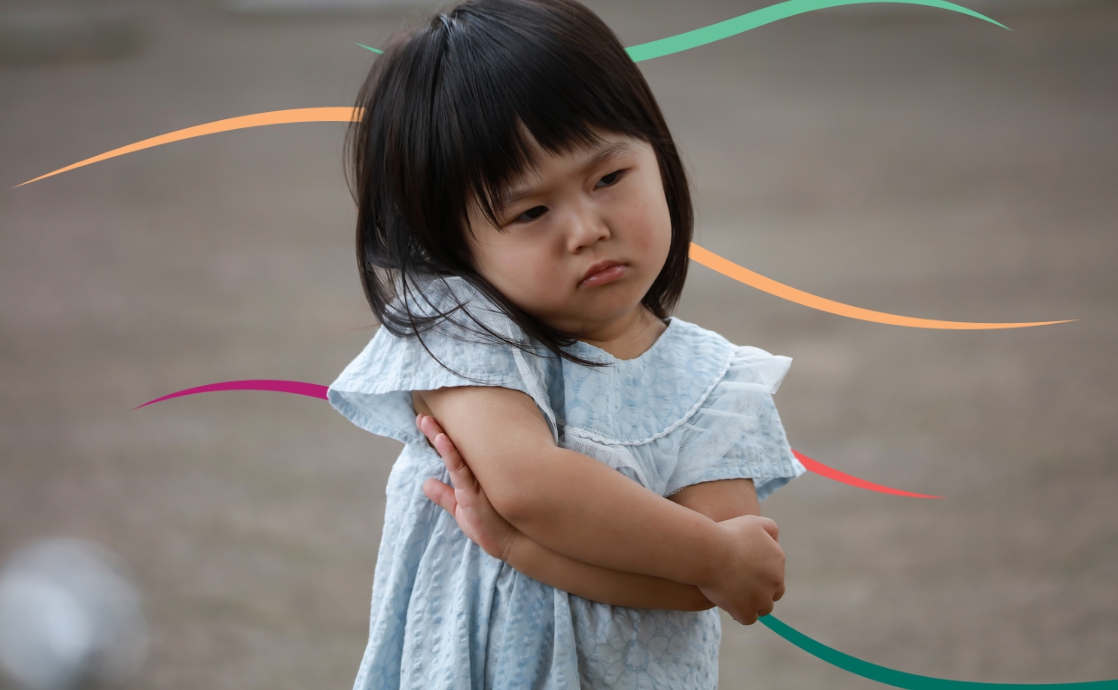The views expressed in our content reflect individual perspectives and do not represent the authoritative views of the Baha'i Faith.
With my children, how can I teach the spiritual virtues of politeness, honesty, authenticity, respect, self-esteem, and trust? At the same time, how can I also empower children against abuse?
We, the grandparents, come to visit, extremely delighted to see our two-year-old granddaughter again. As soon as we reach the doorstep, the child takes a quick glance at us, says “Go away!” and turns around, snuggling up to her mother.
Is this behavior of the child impolite, or authentic? Probably both. But how do we, as adults, deal with it? What do we actually want to educate children for? Politeness? Authenticity? Honesty?
In such a situation, many mothers tend to excuse their children: “She just woke up from her nap, she needs some more time …”
RELATED: Children Love Music: New Songs for Tiny Souls
But is a parental apology really necessary? Shouldn’t the mother explain to her child, for example, “The grandparents are so happy to see you. They feel sad when you don’t look at them.” Should she perhaps encourage her child to greet the grandparents kindly?
In the Baha’i writings, we read “The children must be carefully trained to be most courteous and well-behaved …. Training in morals and good conduct is far more important than book learning.”
This theme of courtesy and kindness to others continues throughout the Baha’i teachings. Abdu’l-Baha wrote: “Beware lest ye harm any soul, or make any heart to sorrow; lest ye wound any man with your words …”
But how do children learn good manners? How can my little granddaughter learn politeness? I know, if she grows up and goes out into the world without it, that she’ll severely handicap herself and her future relationships.
The Balance Between Truthfulness and Kindness
Truthfulness and sincerity are equally important virtues advocated in the Baha’i writings. So isn’t the child being sincere, honest, and authentic when expressing that she wants to be by herself? The Baha’i teachings say:
Truthfulness is the foundation of all human virtues.
We should at all times manifest our truthfulness and sincerity, nay rather, we must be constant in our faithfulness and trustworthiness …
In a few years, my granddaughter will have a richer vocabulary to say what she wants: “Please don’t disturb me – let me continue.” But for the two-year-old, that phrase, “Go away!” now suffices to express herself. I want to respect her will. After all, she is fulfilling exactly what Abdu’l-Baha describes as an educational goal: “Thus shall they [the children] grow and develop, nurtured in righteousness, human dignity, determination, and the will to strive and endure.”
Another scene: The two-year-old slowly goes to the corner of the room. She is still in diapers and shows little interest in the toilet or potty. I sit at the table and watch her. When her eyes meet mine, she yells, “Go away, poopy alone!”
In this scene, everyone would probably agree that it is right to respect her wish and leave her alone. She has evidently internalized the social norm that it is appropriate to withdraw to privacy during certain activities.
But it is not only important to respect her clearly expressed boundary for that reason. In his book The Secret of Divine Civilization, Abdu’l-Baha wrote: “… man’s supreme honor and real happiness lie in self-respect, in high resolves and noble purposes, in integrity and moral quality, in immaculacy of mind.”
Building a Sense of Self-Respect in Children
Children depend on adults to respect and protect their personal “inviolability” or integrity. Integrity is the sense of being whole, of being intact, of feeling one’s own physical and psychological boundaries — and knowing that these boundaries are preserved. When adults protect the integrity of the children entrusted to them, children can develop a good sense of self-esteem. Self-esteem means: I know who I am, what I feel, what I want, and what I don’t want. Strong self-esteem enables growing children to protect themselves from abuse. It empowers them to make responsible decisions and live according to their own values.
RELATED: Teaching Children to Be Hopeful About the Future
But what about good behavior, kindness, and politeness? Most children learn that early enough by observing the examples of adults! Our granddaughter, for example, learns by watching how her mother treats us grandparents in the scene described above – she greets us kindly and explains her daughter’s “Go away!” But she also respects the feeling that the little girl probably has in that moment: It’s too much for her. She wants to stay in the safe space by her mother’s side and not have anything to do with the people who have come.
The mother does not push her child to overcome this feeling and force her to say an artificially friendly “Hello!” to the grandparents. By respecting her daughter’s feelings, and continuing to talk to us in a relaxed manner, she maintains a friendly atmosphere and models polite behavior.
That’s how the child learns politeness – by sensing how the parents not only treat the grandparents kindly and politely, but also treat the child itself with politeness and respect her boundaries.
In my belief, that’s what we should educate our children for: to perceive their feelings and thoughts, to sense their personal boundaries, and more than that, not just sense them but also help the child express them. We can trust that over time, through our example, they will learn to express their boundaries more effectively and kindly through language. When children can show their boundaries, and adults respect the boundaries of children, it protects them from abuse and strengthens their self-esteem. That is the best foundation for learning all other spiritual virtues as well.
This article first appeared in German here.
















Comments
Sign in or create an account
Continue with Googleor